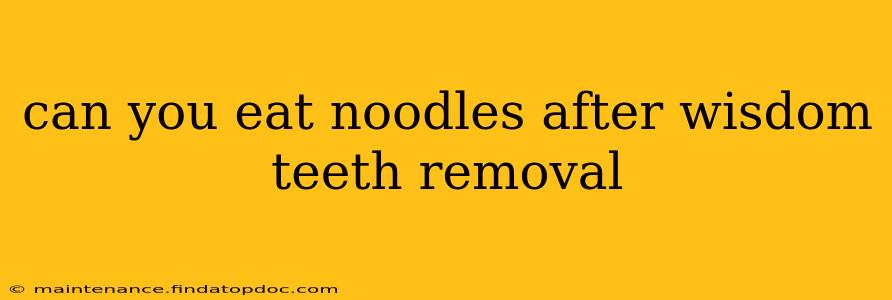Can You Eat Noodles After Wisdom Teeth Removal? A Comprehensive Guide
Having your wisdom teeth removed is a significant oral surgery, and post-operative care is crucial for a smooth recovery. One of the most common questions patients have is about their diet, specifically, can you eat noodles after wisdom teeth removal? The answer isn't a simple yes or no, and depends heavily on the type of noodles and your individual healing process.
This guide will explore the nuances of eating noodles post-wisdom tooth extraction, helping you navigate this crucial phase of recovery. We'll address common concerns and provide helpful tips for a comfortable and healthy recovery.
What Kind of Noodles Are Okay After Wisdom Teeth Removal?
The key factor here is texture. You want to avoid anything that requires excessive chewing or could potentially get lodged in the extraction sites. Therefore:
-
Soft Noodles are Best: Well-cooked, soft noodles like rice noodles, or very well-cooked pasta are generally acceptable. Ensure they are easily mashed or broken down with minimal chewing. Think soup noodles, not crunchy ramen.
-
Avoid Crunchy Noodles: Stay away from anything crunchy like crispy noodles, chow mein noodles, or anything that might irritate your sockets.
-
Consider the Sauce: The sauce can also be a determining factor. Avoid anything too thick or chunky that could get stuck in the extraction sites. Broths and thin, smooth sauces are preferable.
What About Noodle Soup?
Noodle soup can be a great option post-wisdom tooth removal, providing hydration and nutrients without requiring much chewing. However, be mindful of the following:
-
Temperature: Avoid extremely hot soups; lukewarm is best to avoid burning the healing tissues.
-
Ingredients: Choose soups with soft, easily-mashable ingredients. Stay clear of anything with hard vegetables or seeds.
-
Size of Noodles: Opt for smaller, thinner noodles that are easier to manage.
How Long Should I Wait Before Eating Noodles?
The timeframe for introducing noodles back into your diet depends on several factors, including the complexity of the surgery, the individual healing process, and your surgeon's specific recommendations. Generally, it's advisable to follow a liquid or pureed diet for the first 24-48 hours post-surgery. After that, gradually introduce softer foods like well-cooked noodles, as tolerated. Always listen to your body; if you experience pain or discomfort, stop eating and contact your dentist.
What Should I Avoid Eating After Wisdom Teeth Removal?
Beyond crunchy noodles, there are several other foods to avoid in the initial days following wisdom teeth extraction to prevent complications:
- Hard Foods: Avoid anything hard, crunchy, or chewy that requires significant chewing.
- Spicy Foods: Spicy foods can irritate the healing extraction sites.
- Acidic Foods: Acidic foods can also cause discomfort.
- Alcohol and Smoking: These are detrimental to healing and should be avoided.
Remember, these recommendations are general guidelines. Your dentist or oral surgeon will provide the most accurate and personalized advice based on your specific situation. Always follow their instructions carefully.
Are there any alternative foods I can eat after wisdom teeth removal?
Yes, plenty! A post-wisdom tooth extraction diet should focus on soft, easily digestible foods such as:
- Smoothies
- Yogurt
- Applesauce
- Mashed potatoes
- Scrambled eggs
By following these guidelines and carefully listening to your body, you can navigate the post-wisdom tooth extraction diet successfully and enjoy a speedy recovery. Remember, patience and careful attention to your dietary choices are essential for optimal healing.
